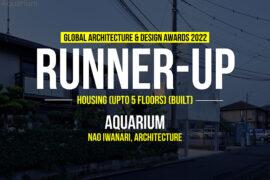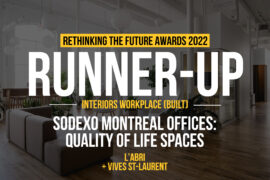The Dock Building, located on Jericho Beach in Vancouver, Canada, serves a large marina of sailboats. The facility provides washrooms and showers, offices for the Harbour Master, instruction space for children, and a variety of workshops to maintain boats, sails, and gear. The project’s practical working needs, very modest budget, and prominent siting required a simple solution that honoured the cannery and industrial heritage of waterfront buildings that were once found on the site a half-century before.
Architecture, Construction & Design Awards 2018
First Award | Category: Commercial (Built)
Architect: MGA | Michael Green Architecture
Team Members: Carmen Derricott, Owner – General Manager, Royal Vancouver Yacht Club
Candice Nichol, Architect – Senior Associate, MGA | Michael Green Architecture
J. Eric Karsh, Structural Engineer – Principal, Equilibrium Consulting
Tim Knight, Builder – Director, Heatherbrae Builders Co. Ltd.
Kai Korinth, Wood Supplier – FraserWoods Industries Ltd.
Ema Peter, Photographer – Photographer, Ema Peter Photography
Mingyuk Chen, Senior Associate – Senior Associate, MGA | Michael Green Architecture
Evelyne St. Jacques, Designer – Designer, MGA | Michael Green Architecture
Country: Canada

The massing is simple. Two intersecting wedge volumes mirror each other to create a lantern to the sea and a lantern to the land. Facing land is a gluelam and translucent polycarbonate wall that brings light into the workshop spaces and glows along the beach at night. Facing the sea and the marina itself are a series of garage doors opening to the shop bays as well as glazed offices for the management of the docks. A back-lit wood screen above the offices hides the mechanical systems in the high volume of the wedge that faces the water. A knife-edge gutter provides an overhang for the shop doors mimicking the razor edge forms of the racing sailboats that line the dock.

The building resides on the waters’ edge just where high tide meets the beach. Almost half of the project budget went to the foundation and piles, leaving the design team with the challenge of meeting the project’s functional needs while delivering something more meaningful to the community.

White standing seam panels are used for the exterior in the spirit of the forms and colour of the sails and boats. The structure is a mix of gluelam posts and beams with light timber infill decking and walls. The interior is predominantly construction-grade fir plywood, providing a tough, easily replaceable interior finish. Throughout, the details are modest and practical to work with the limited project budget.

The design team’s ambition was to demonstrate that all projects from working industrial buildings to boutique museums can and should be realized with grace and architectural dignity. Whereas museums are few, these practical buildings are a common part of our communities. Delivering architecture on a shoestring is always possible. We believe it is important to celebrate the common.
If you’ve missed participating in this award, don’t worry. RTF’s next series of Awards for Excellence in Architecture & Design – is open for Registration.
Click Here







